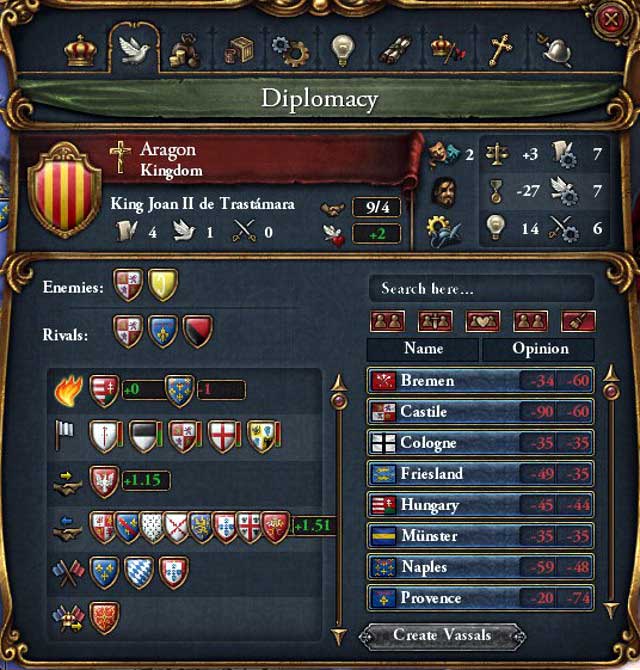Europa Universalis 4: Introduction Diplomacy

You are able to make life easier for yourself, if you operate diplomacy well, by avoiding many exhausting and unnecessary wars during conquests. Therefore, it is good to know how to best use your diplomats.
First of all, in EUIV relations between countries are bilateral and the opinion of country A about country B does not necessarily have to reflect the opinion of country B about A. These are two different values, both can range between -200 and +200. Of course, the higher the relations the higher willingness to cooperate with the other side. Diplomacy is also influenced by, the so called, diplomatic reputation. It is influenced by overextension, advisors and ideas.
Apart from number relations, the countries also have ideas about each other, which will, to a large extent, determine their actions. To learn how you are perceived by the other side, roll your mouse over the icon to the left of the current relations.
Countries may have the following ideas:
- Vassal - the country is a vassal.
- Overlord - you are a vassal to the other side.
- Domineering- you are much weaker than the other side so, it thinks that you should become its subject, which it will be attempting to achieve. Be ready for a war.
- Cordial- you are perceived as a potential ally due to similar interests. The other side will try to keep the good relations.
- Friendly- you are perceived as a natural ally. The other country will try to enter an alliance, even if relations are low.
- Neutral- your opinion with the other country is neutral but, when relations are low, the other side may declare war on you. You should improve your relations with such countries to prevent them from entering a coalition.
- Threatened - you are much stronger than the other side, which fills them with fear. They will be trying to enter an alliance with your enemies or with you directly. It is a better solution to enter alliance with such countries, to somewhat keep them under control. Beware though, because as soon as you show them weakness, they will be ready to act against you.
- Outraged- you have made the other side angry with your actions and it will be trying to strike at you at the first opportune moment. Join any coalition. Activates at the high Aggressive Expansion level.
- Hostile/Rivalry- you are a natural enemy to the other side so, they will try to annihilate their enemy. Unlike the outraged countries, who will, sooner or later, give it all up, your rival will perceive you as an enemy for long years to come.
During the game, you will quickly notice the meager of diplomats. The basic amount of these, for each country is two so, each additional diplomat for a big country is very important. You can acquire them from the Diplomatic, Espionage an Aristocracy ideas, by building an embassy and by becoming the Holy Roman Emperor, after the introduction of an appropriate reform. Each loose diplomat should be used straight away, unless you have a good reason to keep him away from work, e.g. submitting a proposal of peace after winning a battle or to gain more MP. Avoid getting entangled in close relations (e.g. marriages, alliances) with many countries. Three or four countries that you enter such relations with is enough.
Finally, if you plan on any definite offensive actions against a country, and you are not going to conceal it too much, you can make that country a rival. You can have up to three rivals and naming one costs you 10 diplomacy points. It is very useful an option so do not forget about it. You receive the following modifiers per each rival:
- Increased chance for an alliance with the other of its enemies.
- +25% to prestige for winning a battle.
- No 5% penalty to trade efficiency for imposing embargo.
- +20% effectiveness of spy actions.
- -33% cost of diplomatic points for demanding a province during peace talks.
You are not permitted to copy any image, text or info from this page. This site is not associated with and/or endorsed by the developers and the publishers. All logos and images are copyrighted by their respective owners.
Copyright © 2000 - 2026 Webedia Polska SA for gamepressure.com, unofficial game guides, walkthroughs, secrets, game tips, maps & strategies for top games.
